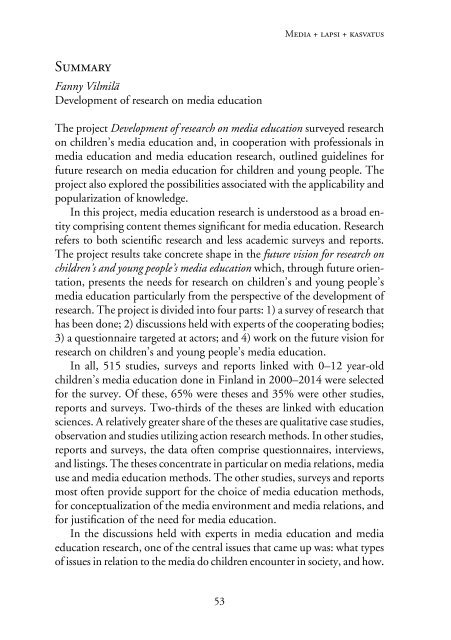mediakasvatuksen_tutkimuksellinen_kehittaminen
mediakasvatuksen_tutkimuksellinen_kehittaminen
mediakasvatuksen_tutkimuksellinen_kehittaminen
Create successful ePaper yourself
Turn your PDF publications into a flip-book with our unique Google optimized e-Paper software.
Media + lapsi + kasvatus<br />
Summary<br />
Fanny Vilmilä<br />
Development of research on media education<br />
The project Development of research on media education surveyed research<br />
on children’s media education and, in cooperation with professionals in<br />
media education and media education research, outlined guidelines for<br />
future research on media education for children and young people. The<br />
project also explored the possibilities associated with the applicability and<br />
popularization of knowledge.<br />
In this project, media education research is understood as a broad entity<br />
comprising content themes significant for media education. Research<br />
refers to both scientific research and less academic surveys and reports.<br />
The project results take concrete shape in the future vision for research on<br />
children’s and young people’s media education which, through future orientation,<br />
presents the needs for research on children’s and young people’s<br />
media education particularly from the perspective of the development of<br />
research. The project is divided into four parts: 1) a survey of research that<br />
has been done; 2) discussions held with experts of the cooperating bodies;<br />
3) a questionnaire targeted at actors; and 4) work on the future vision for<br />
research on children’s and young people’s media education.<br />
In all, 515 studies, surveys and reports linked with 0–12 year-old<br />
children’s media education done in Finland in 2000–2014 were selected<br />
for the survey. Of these, 65% were theses and 35% were other studies,<br />
reports and surveys. Two-thirds of the theses are linked with education<br />
sciences. A relatively greater share of the theses are qualitative case studies,<br />
observation and studies utilizing action research methods. In other studies,<br />
reports and surveys, the data often comprise questionnaires, interviews,<br />
and listings. The theses concentrate in particular on media relations, media<br />
use and media education methods. The other studies, surveys and reports<br />
most often provide support for the choice of media education methods,<br />
for conceptualization of the media environment and media relations, and<br />
for justification of the need for media education.<br />
In the discussions held with experts in media education and media<br />
education research, one of the central issues that came up was: what types<br />
of issues in relation to the media do children encounter in society, and how.<br />
53


